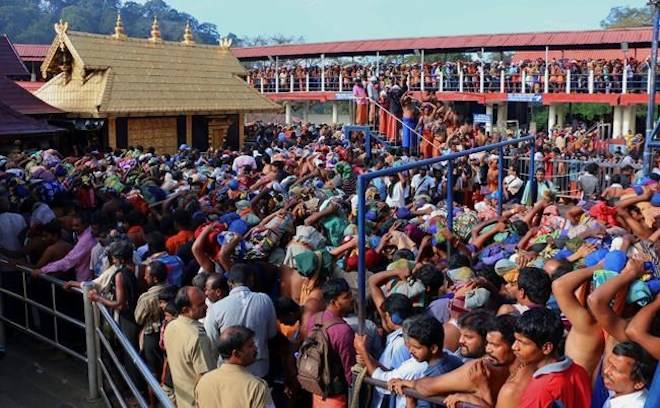India’s Supreme Court on Friday lifted a temple’s ban on women of menstruating age, holding that equality is supreme irrespective of age and gender.
The historic Sabarimala temple had barred women age 10 to 50 from entering the temple, one of the largest Hindu pilgrimage centres in the world.
Some religious figures consider menstruating women to be impure. But the court ruled 4-1 the practice of excluding women cannot be regarded as an essential religious practice.
The temple argued the celibate nature of Sabarimala temple’s presiding deity Lord Ayyappa was protected by India’s Constitution.
The top court’s verdict is part a string of recent rulings that recognize more rights of women, challenging deeply conservative Indian society. On Thursday, it scrapped a law which did not allow wives to bring criminal charges against adulterous husbands.
Chief Justice Dipak Misra in part of Friday’s judgment said devotion could not be discriminatory and a patriarchal notion could not trump equality in devotion.
“Religion cannot be the cover to deny women the right to worship. To treat women as children of a lesser God is to blink at constitutional morality,” he said.
Rahul Eswaran, an attorney for the temple, said its management would seek a review of the court’s decision. It noted girls and women of other ages were allowed in the temple without restrictions.
Chhavi Methi, a women’s rights activist, hailed the court verdict, but said its acceptance by temple authorities remained to be seen.
“I am doubtful the temple authorities would take it in the right spirit. Women would accept it, but its implementation might pose a problem,” she said.
Sabarimala is surrounded by mountains and dense forests in its location at the Periyar Tiger Reserve in southern Kerala state. Up to 50 million devotees visit the temple every year.
Several temples across India have banned women, saying it is intended to preserve the purity of their shrines. The operators of a temple in Rajasthan state believe Hindu god Kartikeya curses women who enter the temple, instead of blessing them.
The country’s secular courts have been intervening recently in cases where a religion’s gender beliefs were seen as discriminatory.
In 2016, a court ordered the Maharashtra state government to ensure that no woman was denied entry to the Shani Shingapur temple in the town of Ahmednagar.
Also, the Mumbai High Court ruled that women cannot be barred from the inner sanctum of the Haji Ali shrine, an Islamic mosque and tomb in the southern part of the city.
Related: Former B.C. gangster arrested for drug operation in India
Related: Federal leaders trade barbs about India trip at press gallery dinner
Ashok Sharma, The Associated Press



